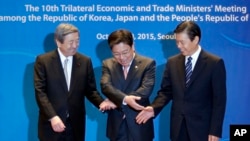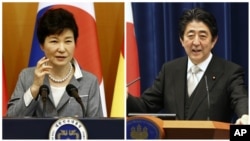In Seoul Friday trade ministers from Japan, China and South Korea met for the first time in three and a half years to discuss plans to create a trilateral free trade agreement and advance a regional version of the Trans-Pacific Partnership (TPP.)
The trilateral economic meeting was held in advance of Sunday’s leaders’ summit.
These three countries account for about 20 percent of the world economy but since 2012 strained relations has stifled regional trade coordination and integration efforts.
China’s representative to the Seoul trade trilateral was International Trade Representative Zhong Shan. Given China’s recent economic downturn and slow global growth, Zhong said the major Asian powers need to boost regional trade to promote growth.
"Today's world economy has been deeply reformed after the crisis. As an economic center of Asia, the role of Korea, China and Japan is crucial for global economic recovery," Zhong said.
In addition to endorsing a trilateral free trade zone the trade officials from Beijing, Tokyo and Seoul discussed strategies to advance the Regional Comprehensive Economic Partnership (RCEP), an all-Asia free trade agreement. Negotiations for the 16 country RCEP began in 2013 but have stalled of late. The regional trade agreement would include the Northeast Asian powers as well as India and Australia but would exclude the U.S.
Japan’s Minister for Economy, Trade and Industry, Motoo Hayashi, who is in Seoul for Friday’s talks, voiced support for these alternative agreements to lower trade barriers.
"To help global economic growth, the three countries should cooperate closer in trade investment and economic areas. We also have to raise the potency of Northeast Asia and the Pacific area. The most important thing is to create trade and investment liberalization in this region," Hayashi said.
South Korea has expressed an interest in joining the U.S.-led TPP free trade initiative that was struck in October and involves 12 Pacific Rim economies that includes Japan and the U.S. but not China.
At the summit in Seoul South Korean Minister of Trade, Industry and Energy, Yoon Sang-Jick voiced optimism that these regional free trade agreements can be implemented as well.
"I expect that FTA between Korea, China and Japan and the RCEP will be signed as reciprocal agreements. Furthermore, the three countries should show strong leadership to form an East Asian Community," Yoon said.
Many see the RCEP as a China-driven rival to the U.S.-led TPP.
Koichi Nakano a professor of political science at Sophia University in Tokyo says the U.S. trade initiative is supposed to be an inclusive framework with an expanding membership, but strained relations between Washington and Beijing could fuel regional efforts to develop an alternative.
“The intention is to set the global standard for trade with the eventual participation of China but if not then it is possible that TPP will be in fact contribute to the perception that the U.S. and Japan are strengthening the alliance to encircle and contain China,” said Nakano.
On Saturday in Seoul South Korean President Park Geun-hye will hold bilateral talks with Chinese Premier Li Keqiang. On Sunday Japanese Prime Minister Shinzo Abe will join the talks for the first trilateral leaders’ summit among these regional powers since 2012.
Tensions over conflicting claims to islands and growing anger at Japan’s seeming unrepentant attitude over its wartime past led to the suspension of regular high-level talks on regional security and economic development.
In addition to discussing regional economic development the South Korean and Chinese leaders will press the Japanese prime minster to address the contentious “comfort women” issue.
Park in particular has been a vocal proponent for the thousands of Asian “comfort women” forced into sexual slavery by Japan’s military during its occupation of Asia and World War II. She has demanded Abe make a “sincere apology” and provide restitution to the surviving victims for their pain and suffering.
This week Park said that resolving this issue is the key to reestablishing a stable diplomatic relationship with Japan.
Abe has articulated condolences for the atrocities that occurred during WWII and promised to uphold apologies made by past Japanese leaders, including the 1993 Kono Statement that offered apologies and remorse to comfort women.
However, he has refused to accede to Seoul’s demand for stronger language and compensation. In his August speech commemorating the 70th anniversary of the end of World War II Abe said that the peaceful and democratic Japan of today where over eighty percent of the population was born after the war, should not be held accountable for these past atrocities.
“We must not let our children, grandchildren, and even further generations to come, who have nothing to do with that war, be predestined to apologize,” Abe said.
Youmi Kim in Seoul contributed to this report.






